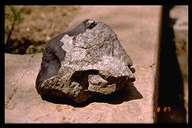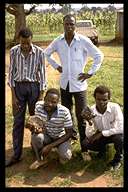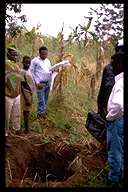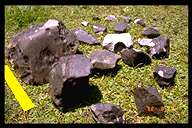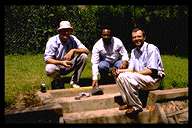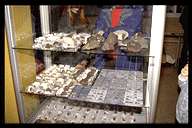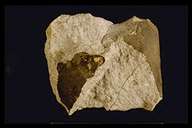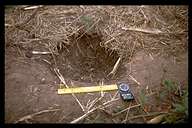The great Mbale meteorite fall.
Mbale, Uganda, august 14, 1992.
Information on Meteorites
On 1992 August 14 at 12:40 UTC an ordinary chondrite of type L5/6 entered
the atmosphere over Mbale, Uganda, broke up and caused a strewn field of
size 3 x 7 km.
 Left:
A part of the Mbale strewnfield is brought together for a photographic registration
at the Dutch National Museum of Natural History (NNM). April 4, 1993.
Left:
A part of the Mbale strewnfield is brought together for a photographic registration
at the Dutch National Museum of Natural History (NNM). April 4, 1993.
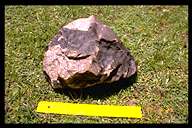 Right: The main mass of the Mbale fall: 27,3 kilograms.
Right: The main mass of the Mbale fall: 27,3 kilograms.
Shortly after the fall, an expedition gathered eye witness accounts and
located the position of 48 impacts of masses between 0.1 g and 27.4 kg.
Short-lived radionuclide data were measured for two specimens,
one of which was only 12 days after the fall. Subsequent recoveries of
fragments has resulted in a total of 863 mass estimates by 1993 October.
The surface of all fragments contain fusion crust.
 Left: The meteorite shower caused some minor inconveniences. Most remarkably,
a young Ugandan boy was hit on the head by a small specimen. The fall
of the 3 grams fragment was broken by banana tree leaves.
Left: The meteorite shower caused some minor inconveniences. Most remarkably,
a young Ugandan boy was hit on the head by a small specimen. The fall
of the 3 grams fragment was broken by banana tree leaves.
The data are interpreted as to indicate that the meteorite had an initial
mass between 400-1000 kg. (most likely ~ 1000 kg) and approached Mbale
from Az=185+/-15 degrees and H=55 +/- 15 degrees, and V inf = 13.5 +/- 1.5 km/s.
Orbital elements are given. Fragmentation of the initial mass started
probably above 25 km altitude, but the final catastrophic breakup occured
at an altitude of 10-14 km. An estimated 190 +/- 40 kg reached the
Earth's surface minutes after the final breakup of which 150 kg
of material has been recovered.
More images of the Mbale Meteorite Fall
Click on the image to retrieve the hi-res image from our FTP-server
For a full report see: The Mbale meteorite shower.
Meteoritics.
vol. 29 no. 2. March 1994. pp. 246-254
 Left:
A part of the Mbale strewnfield is brought together for a photographic registration
at the Dutch National Museum of Natural History (NNM). April 4, 1993.
Left:
A part of the Mbale strewnfield is brought together for a photographic registration
at the Dutch National Museum of Natural History (NNM). April 4, 1993. Right: The main mass of the Mbale fall: 27,3 kilograms.
Right: The main mass of the Mbale fall: 27,3 kilograms. Left: The meteorite shower caused some minor inconveniences. Most remarkably,
a young Ugandan boy was hit on the head by a small specimen. The fall
of the 3 grams fragment was broken by banana tree leaves.
Left: The meteorite shower caused some minor inconveniences. Most remarkably,
a young Ugandan boy was hit on the head by a small specimen. The fall
of the 3 grams fragment was broken by banana tree leaves.








